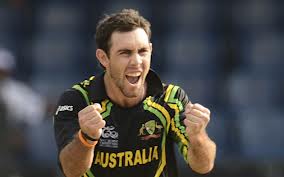Contrary to expectations, Australia captain Michael Clarke and the legendary Ricky Ponting were sold at their base price of $400,000 to the Pune Warriors and Mumbai Indians, respectively.
Maxwell, playing against the West Indies back home, was the lone player to hit the $1 million mark till the lunch break with the Mumbai Indians shelling out a big packet for the 24-year-old. The Victorian represented the Delhi Daredevils in the last edition.
"Maxwell is a good kid, an exceptional talent and it will be exciting to see him play. It will be nice to have him in the team," said Anil Kumble, mentor of Mumbai Indians.
Of the 54 players auctioned so far, the Indians were expectedly on high demand. There are seven Indians in the auction comprising 108 players.
Nayar, who had a stellar domestic season for Mumbai, went to Pune Warriors for $675,000. Six franchises were interested in buying the all-rounder.
Royal Challengers Bangalore got India discard RP Singh for his base price of $400,000.
Fast bowlers Manpreet Gony and Jaydev Unadkat also got a good deal. IPL debutants Sunrisers Hyderabad paid $500,000 for Gony while Unadkat went to the Royal Challengers fetching $25,000 more than him.
Speedster Pankaj Singh went to Royal Challengers for $150,000 while Sudeep Tyagi was picked up by Sunrisers for $100,000.
There were surprises in the bidding for Sri Lankan players. While in-form spinner Rangana Herath found no takers, Pune Warriors bought Ajantha Mendis for $725,000 after a three-way battle with Mumbai Indians and Kolkata Knight Riders. Mendis had a base price of $50,000.
On similar base price, all-rounder Thisara Perera attracted $675,000 from Sunrisers, who beat Rajasthan Royals, Mumbai Indians and Chennai Super Kings in the bid.
Earlier, Ponting, who played for Kolkata Knight Riders in the inaugural season of the IPL, was the first player to go under the hammer.
None of the teams showed interest in him and he was put in the unsold category by auctioneer Richard Madley. But Mumbai Indians made a late bid for the former Australian captain and Madley allowed the bid as none showed interest in the 38-year-old cricketer, who retired from international cricket last year.
The next player to go under the hammer was pacer Rudra Pratap Singh, who was sold to Royal Challengers, Bangalore for $400,000, four times his base price. Chennai Super Kings, Rajasthan Royals and Sunrisers Hyderabad were also interested in the India discard, who was the highest wicket-taker in the second edition in 2009.
The third marquee player South African all-rounder Johan Botha, who went to Rajasthan last year for $950,000, was bought by Delhi Daredevils for $450,000 after an aggressive bidding-match with Pune. Botha had a base price of $300,000.
Clarke, who was the last player in the marquee section, was sold to his old team Pune Warriors for $400,000. The Warriors were the first to bid for the Australian captain and with no no other bids they bought him back for much less that what they had spent last season.
Earlier post:
Clarke, Ponting sold for base price at IPL auction
Chennai, Feb 3: Contrary to expectations, Australia captain Michael Clarke and the legendary Ricky Ponting could secure only their base price of $400,000 each when picked up by Pune Warriors and Mumbai Indians, respectively, in the players' auction of the Indian Premier League (IPL) here Sunday.
Ponting, who played for Kolkata Knight Riders in the inaugural season of the IPL, was the first player to go under the hammer.
None of the teams showed interest in him and he was put in the unsold category by auctioneer Richard Madley. But Mumbai Indians made a late bid for the former Australian captain and Madley allowed the bid as none showed interest in the 38-year-old cricketer, who retired from international cricket last year.
The next player to go under the hammer was pacer Rudra Pratap Singh, who was sold to Royal Challengers Bangalore for $400,000, four times his base price. Chennai Super Kings, Rajasthan Royals and Sunrisers Hyderabad were also interested in the India discard, who was the highest wicket-taker in the second edition in 2009.
The third marquee player South African all-rounder Johan Botha, who went to Rajasthan last year for $950,000, was bought by Delhi Daredevils for $450,000 after an aggressive bidding-match with Pune. Botha had a base price of $300,000.
Clarke, who was the last player in the marquee section, was sold to his old team Pune Warriors for $400,000. The Warriors were the first to bid for the Australian captain and with no no other bids they bought him back for much less that what they had spent last season.





Comments
Add new comment